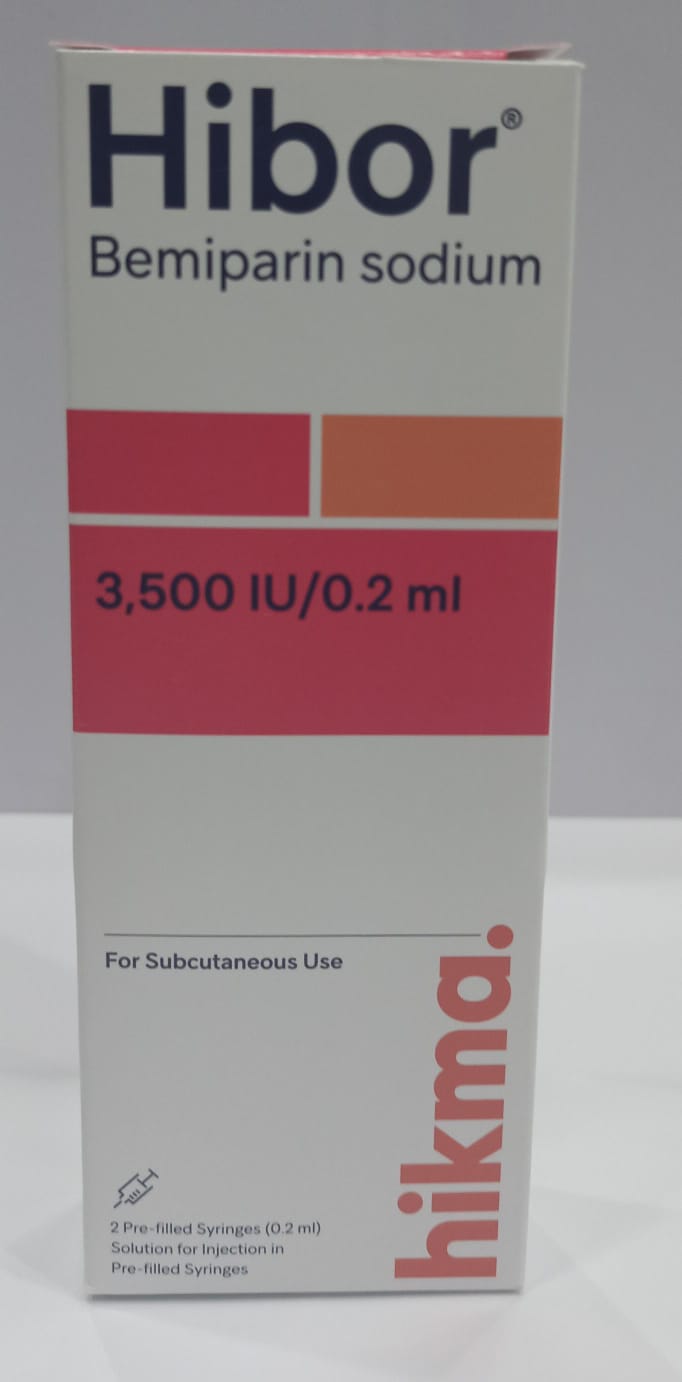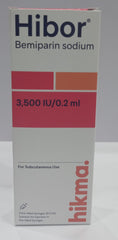Free Shipping For Orders Over 100 Riyal


Hibor 3500 Iu Injection
-
39.65 SR

-

-
39.65

Couldn't load pickup availability
Description
xÂ
Hibor Components
Hibor injections contain Bemiparin sodium, which belongs to anti-coagulants, which helps prevent clots in blood vessels.
Hibor injections are second-generation low molecular weight heparin.
Hibor 3500 uses
Hibor injections are used in:
-
Prevention of blood clots in veins after general abdominal surgery in patients with a moderate risk of venous thromboembolism.
-
Prevention of thromboembolism disease in non-surgical patients.
-
Prevent the formation of clots in the extracorporeal circuit during hemodialysis.
-
Prevention of vein clots after major orthopedic surgery in patients with a high risk of venous thromboembolism.
-
Secondary prevention of venous thromboembolism recurrence in patients who suffer from deep venous thrombosis and have a transient high risk.
-
Treatment of deep venous thrombosis.
Hibor Dosage
-
Hibor dosage varies depending on the patient's condition, and according to the doctor's guidelines.
-
The drug is usually given once a day.
-
The patient receives a Hibor injection from a healthcare specialist.
-
Hibor is not injected into the muscle, nor is it mixed with any other medication.
-
Prevention of blood clots in veins after general abdominal surgery: 2,500 IU per day with subcutaneous injections. Preventive treatment lasts for at least 7 - 10 days after the operation until the patient starts moving again or the risk of developing blood clots decreases.
-
Prevention of blood clots in non-surgical patients: 2,500 or 3,500 IU per day with subcutaneous injections.
-
Prevention of blood clots during dialysis: 3,500 IU is injected into the arterial side of the dialysis machine.
-
Prevention of blood clots in veins after major orthopedic surgery: 3,500 IU per day with subcutaneous injections. Preventive treatment lasts for at least 7 - 10 days after the operation until the patient starts moving again or the risk of developing blood clots decreases.
Hibor side effects
-
bleeding.
-
Thrombocytopenia
-
Bruises in the injection site.
-
temporarily elevated levels of liver enzymes.
Hibor contraindications
Hibor injections are not used in the case of:
-
Allergy to heparin or Bemiparin.
-
History of thrombocytopenia-induced heparin.
-
Patients who suffer from any disease cause excessive bleeding.
-
People with severe liver disease.
-
Pancreatic disease.
-
Patients suffering from disseminated intravascular coagulation (DIC) which is attributable to a thrombocytopenia-induced heparin.
-
Bacterial endocarditis.
-
Cases of active large bleeding, such as active stomach ulcers, stroke or brain tumors, or the condition of suffering from brain bleeding.
-
Injury or performing surgery in the eye or ear, brain or spine.
-
Spinal or epidural anesthesia is contraindicated in surgical operations if the patient receives Hibor injections.
Warnings
-
The drug is not used interchangeably with any other drug, even if it is low-molecular-weight heparin, it may vary in manufacturing method, dosage, or units.
-
Hibor injections are not used for intramuscular injection.
-
In the case of epidural anesthesia, Hibor injection therapy should begin after 4 hours of catheter removal, and the next dose after the completion of the operation.
-
Hibor is not used for children.
-
There is insufficient evidence about the safety of using the drug during pregnancy or breastfeeding.
Precautions
The doctor should be consulted before using the drug in case of:
-
kidney disease.
-
Liver disease.
-
High blood pressure.
-
Gastric ulcers.
-
Thrombocytopenia.
-
Diseases that increase the risk of bleeding.
Drug interactions
You should consult your doctor before using Hibor injections along with any other medication, especially:
-
Oral anticoagulants.
-
Non-steroidal anti-inflammatory drugs.
-
Dextran.
-
Systemic glucocorticoids.
Hibor price
Hibor 3,500 IU injections price is 39.65 SAR.
Shippping & Return
xسياسة الاسترجاع والاستبدال
هدفنا في متجر الجواهر هو رضاكم التام 🌸، ونسعى دايمًا نقدم أفضل تجربة تسوق بكل وضوح وعدل. نتعامل مع عملائنا بكل مصداقية، ونتمنى يكون التعامل متبادل بنفس الروح.
في حال تم طلب الإلغاء أو الاسترجاع قبل بدء الشحن، يتم إرجاع المبلغ كامل للعميل.
ويحق للعميل طلب الاسترجاع خلال مدة 3 أيام من تاريخ الاستلام، بشرط:
- أن يكون المنتج غير مستخدم ولم يتم فتحه.
- أن يكون بحالته الأصلية وخالي من أي تلف.
- ألا يكون المنتج من الأصناف المستثناة من الاسترجاع أو الاستبدال.
المنتجات غير القابلة للاسترجاع أو الاستبدال:
- المنتجات التي تحتاج تخزين خاص مثل: أدوية الثلاجة، الحليب، وأغذية الأطفال.
- مزيلات العرق ومنتجات العناية الشخصية والنسائية، إلا في حال وجود عيب مصنعي.
طريقة طلب الاسترجاع أو الاستبدال:
للطلب، يرجى التواصل معنا عبر واتساب على الرقم:
0563649160
في حال طلب الاسترجاع:
بعد التأكيد، يتم إرسال بوليصة شحن للعميل لتسليم المنتج لشركة الشحن وهو بحالته الأصلية.
بعد استلام شركة الشحن للمنتج، يتم إرجاع المبلغ بعد خصم قيمة الشحن خلال مدة من 5 إلى 7 أيام عمل.
في حال طلب الاستبدال:
يتم احتساب قيمة شحن جديدة للطلب البديل.
تنويه مهم:
في حال وصول المنتج بشكل خاطئ من شركة الشحن (باستثناء أدوية الثلاجة، الحليب، وأغذية الأطفال) أو تم إرسال منتج غير صحيح من صيدلية الجواهر المميز، يرجى التواصل مع خدمة العملاء، وبعد التأكد من المشكلة سيتم إرجاع المبلغ كاملًا بعد تسليم المنتج لشركة الشحن.
في حال وصول المنتج مفتوح أو مستخدم أو بحالة غير التي تم شحنه بها، سيتم إلغاء طلب الاسترجاع.
في حال كان الخطأ من شركة الشحن أو تم إرسال منتج خاطئ، نتحمل تكلفة إرسال المنتج لفرع شركة الشحن عبر تطبيقات التوصيل بحد أقصى 20 ريال، في حال كان الفرع بعيد.
في حال عدم استلام العميل للطلب وعودة الشحنة لنا، يتم إرجاع المبلغ بعد خصم قيمة الشحن، وإذا رغب العميل بإعادة الشحن مرة أخرى يتم دفع قيمة شحن جديدة.
You may also like!
Recently Viewed Products
- Choosing a selection results in a full page refresh.
